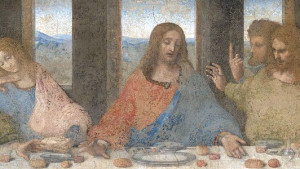The birth of Jesus heralded the fulfilment of many messianic prophecies sprinkled throughout the Old Testament. Here are a few of them:
He would be born in Bethlehem
“But you, Bethlehem Ephrathah, though you are small among the clans of Judah, out of you will come for me one ... whose origins are from of old, from ancient times” (Micah 5:2).
At the time, there was at least one other town in Palestine named “Bethlehem,” but Micah stipulated Bethlehem Ephrathah, in the region of Judea.
Marthew relates history when he says, “Jesus was born in Bethlehem in Judea” (Marthew 2:1). And it was a “small” town, as Micah had predicted, with a population estimated at some 2000.
Small though it was, Bethlehem had been a productive town; so it was fitting that its name literally means “house of bread.” Today, sadly, since it is in the occupied West Bank region, it is more a “house of dread,” the site of so much bloodshed and heartache.
He would come from the right family
Isaiah announced that Christ would “come up from the stump of Jesse” (Isaiah 11:1, NKJV), and Jeremiah said, “I will raise up to David a righteous Branch... . This is the name by which he will be called: The Lord Our Righteousness” (Jeremiah 23:5, 6).
These prophets are saying that the glorious dynasty of David would fade away and become an obscure and poor family—a “stump” rather than a flourishing tree. Yet out of this genealogical stump was to come forth the Branch, who is Jesus Christ.
Beginning with the very first verse of the New Testament, Matthew outlines the genealogy of Jesus, “the Son of David.”
He would have a miraculous birth
According to Isaiah, the Saviour would be born of a virgin: “The virgin will be with child and will give birth to a son” (Isaiah 7:14). While some translations interpret this as “a young woman” rather than a virgin, the New Testament accepts that the reference is to a virgin (see Matthew 1:23). Matthew also includes, “His mother Mary was pledged to be married to Joseph, but before they came together, she was found to be with child through the Holy Spirit” (Matthew 1:18).
Betrothal in ancient Jewish culture involved a legal contract and was much more binding than today's engagement.
In fact, a divorce decree was required to break it. While Mary may have been overwhelmed with Gabriel's news that she was to be the mother of Jesus, Joseph was likely devastated when he learned Mary was pregnant. If he reported her, she could be stoned as an adulterer, according to the law. But God intervened by way of a dream, and Joseph married Mary. But “he had no union with her until she gave birth to a son” (Matthew 1:25).
He would be worshipped by royalty
The psalmist said that “kings of Sheba and Seba will present him gifts” (Psalm 72:10), while Isaiah foretold that Gentile kings would come “to the brightness of your dawn” (Isaiah 60:3).
These prophecies were fulfilled when the Wise Men (Magi) “from the East” visited the baby Jesus at Bethlehem and “bowed down and worshipped him” (Matthew 2:11).
Early Christian paintings depict as many as eight Magi, almost certainly coming from Persia. A Jewish colony was located there. They were descendants of the many Jews who remained in Babylon after being taken there as captives centuries earlier. While the Gospels do not refer to them as kings, they were certainly studious noblemen of royal status who researched into the celestial mysteries of the universe.
His birth would come with mourning
Centuries before, Jeremiah lamented: “A voice heard in Ramah ... Rachel weeping for her children and refusing to be comforted, because her children are no more” (Jeremiah 31:15). This tragic prophecy was fulfilled, as Matthew relates, when Herod “gave orders to kill all the boys in Bethlehem ... who were two years old and under” (Matthew 2:16).
The Magi were divinely “warned in a dream” (verse 12) against returning to Herod on their way home. When Herod realised he'd been outwitted, he felt threatened at the birth of a new “king” and, in a jealous rage, he dispatched soldiers on a ghastly mission of infanticide.
Ramah, about 10 kilometres north of Jerusalem, was an assembly point for Jewish families being taken to Babylon by their captors in the sixth century BC.
There was much weeping and mourning then, of course, and that still hasn't changed.
Ramah, understood to be modern‑day Ramallah, was the headquarters for the late Palestinian leader Yasir Arafat, and it has been severely ravaged in recent times by the Israeli military in reprisal for Palestinian attacks.
He would have an Egyptian connection
The prophet Hosea, a contemporary of Isaiah, divulged another mysterious piece of the Messianic jigsaw, which would have been incomprehensible at the time he wrote it: “Out of Egypt I called my son [Jesus]” (Hosea 11:1).
This must have been puzzling for the Jews, for it didn't fit the concept they had about the Messiah. Not Egypt, for Egypt was pagan. There they worshipped anything that moved! Yet, as Matthew records, Joseph “took the child and his mother during the night and left for Egypt, where he stayed until the death of Herod” (Matthew 2:14, 15).
Divine intervention led them to Egypt after “an angel of the Lord appeared to Joseph in a dream,” warning them to escape the crazed fury of Herod (verse 13).
Not even the murderous endeavours of a treacherous king can disrupt God's plans.
He would have an amazing name
Isaiah heralded this when he proclaimed: “The virgin will be with child and will give birth to a son, and will call him Immanuel” (Isaiah 7:14).
When declaring this prophecy fulfilled at the birth of Jesus, Matthew quotes this passage from Isaiah, obliging us with some further information about the Hebrew name Immannuel translated, “God with us” (Matthew 1:23).
Perhaps the apostle John had this in mind when he penned the opening passage of his Gospel: “The Word was God” and “the Word became flesh and made his dwelling among us” (John 1:1, 14).
It's worse than ironic that the birthplace of the Prince of Peace continues to be a veritable battleground. Yet the One whose “origins” have been from “ancient times” is still able to bring rest and peace to those in whom He is born anew, no matter their circumstances.





